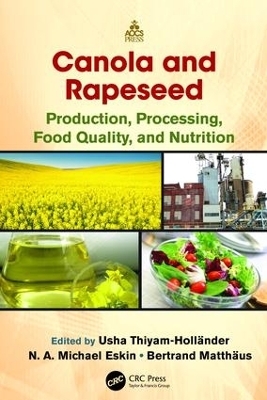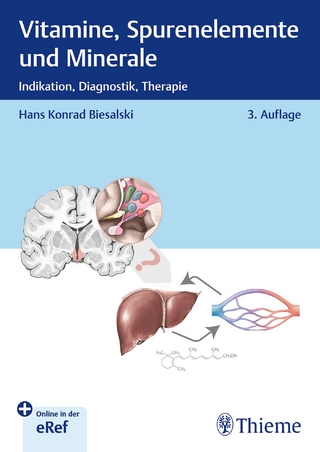
Canola and Rapeseed
CRC Press (Verlag)
978-1-138-19997-2 (ISBN)
Topics include:
The historical development, properties, and performance of canola
Characteristics and bioactives of sinapic acid derivatives and the decarboxylation pathways leading to their formation
Canola protein processing
High omega-9 canola oils and their future applications
Modification of Brassica oilseeds
Rapid analytical methods for measuring oil content
The potential of ultrasound and supercritical fluid extraction for producing value-added by-products
The processing of virgin rapeseed oils in Europe
Extraction and application of canola protein
The frying stability of high-oleic low-linolenic acid canola oils
The potential of mustard oil for biodiesel
The final chapters demonstrate the health benefits of canola, including antioxidant, antimutagenic, and anticancer properties. Authored by experienced researchers in the field, the book chapters have been expanded considerably to include a number of areas not contained in the original workshop, providing comprehensive coverage of the potential of this essential crop.
Usha Thiyam-Holländer is an assistant professor at the Department of Human Nutritional Sciences, based at the Richardson Centre for Functional Foods and Nutraceuticals, University of Manitoba, Canada, where she researches the impact of various novel aspects of processing on canola oil and minor components. Her work also focuses on plant-based functional foods and nutraceutical ingredients and the impact of innovative technology, isolation, and optimization. Her interests include biorefining and environmentally friendly processes for deriving functional ingredients. Michael N.A. Eskin is professor and associate dean in the Department of Human Nutritional Sciences, Faculty of Human Ecology, University of Manitoba, Canada. He has done extensive research on edible oils and was involved in the early development of canola oil. He has garnered of a number of awards, including the AOCS Timothy Mount Award for excellence in the science and technology of edible oils and the Canadian Institute of Food Science and Technology W.J. Eva Award for outstanding contribution to Canadian Science and Technology. Dr. Eskin was the 2012 winner of the prestigious IFT Stephen S. Chang Award for significant contributions to lipid science, particularly as related to his work on canola oil. Bertrand Matthäus runs a laboratory at the Max Rubner-Institut (MRI), Federal Research Institute for Nutrition and Food, in the Department of Lipid Research of the German Federal Ministry of Nutrition, Agriculture and Consumer Protection. He conducts research dealing with the improvement of the quality of fats and oils, especially canola oil. His work focuses on the investigation of frying processes; contaminants such as 3-MCPD esters, acrylamide, phthalates and 4-hydroxy-2-trans-nonenal; and the investigation of the oxidation of edible fats and oils.
Canola Research: Historical and Recent Aspects. An Update on Characterization and Bioactivities of Sinapic Acid Derivatives. Valuable Vinylphenols from Rapeseed and Canola: Decarboxylative Pathways. Processing of Canola Proteins: A Review. The Future of Omega- Oils. Modification of Seed Oil Formation in. Oilseed Species. Measurement of Oil Content by Rapid Analytical Techniques. The Potential for Ultrasound and Supercritical Fluid Extraction for Value-Added Processing of Canola. Processing of Virgin Canola Oils. Rapeseed Proteins: Recent Results on Extraction and Application. Frying Stability of High-Oleic, Low-Linolenic Canola Oils. Biodiesel from Mustard Oil. Canola Oil and Heart Health: A Historical Perspective. Canola Oil: Evolving Research in Obesity and Insulin Resistance. Rapeseed and Canola Phenolics: Antioxidant Attributes and Efficacy. Nutritional Impact of Fatty Acid Composition of Canola Oil and Its Effect on the Oxidative Deterioration. Effect of Canolol on Oxidation of Edible Oils. Canola Oil, Canolol and Cancer: Evolving Research. Canolol as a Promising Nutraceutical: Status and Scope. Index.
| Erscheinungsdatum | 07.01.2017 |
|---|---|
| Zusatzinfo | 51 Tables, black and white; 131 Illustrations, black and white |
| Verlagsort | London |
| Sprache | englisch |
| Maße | 156 x 234 mm |
| Gewicht | 453 g |
| Themenwelt | Medizin / Pharmazie ► Gesundheitsfachberufe ► Diätassistenz / Ernährungsberatung |
| Naturwissenschaften ► Biologie | |
| Technik ► Lebensmitteltechnologie | |
| ISBN-10 | 1-138-19997-4 / 1138199974 |
| ISBN-13 | 978-1-138-19997-2 / 9781138199972 |
| Zustand | Neuware |
| Haben Sie eine Frage zum Produkt? |
aus dem Bereich


